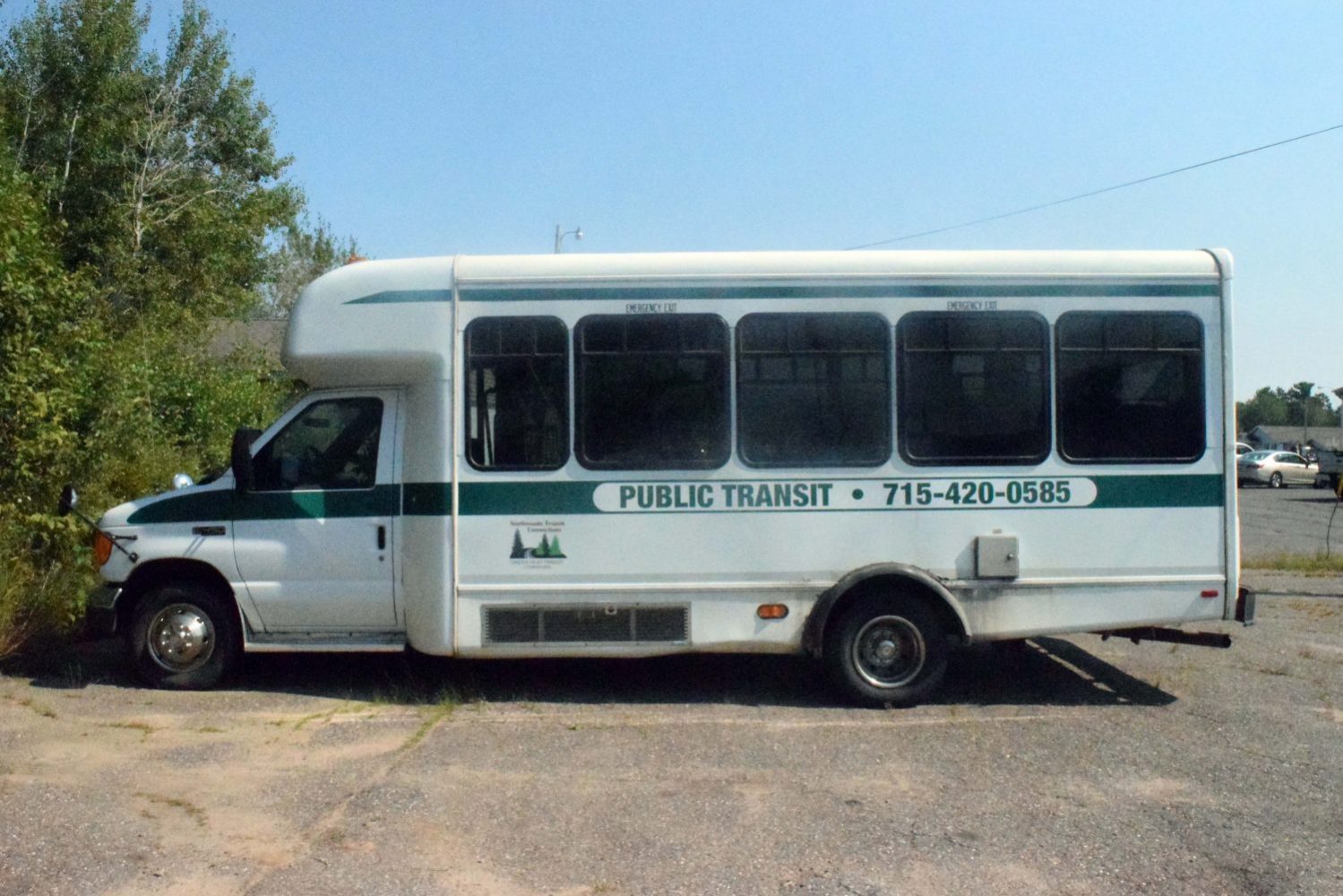Oneida Vilas Transit Commission facing financial woes

Concern buses could halt if federal funds not received, expenses not reduced
BY KEVIN BONESKE
REPORTER/PHOTOGRAPHER
After not yet receiving contracted federal funds for this year, coupled with higher-than-budgeted expenses, the Oneida Vilas Transit Commission now finds itself in a financial crunch in which there is uncertainty over whether the Transit Commission’s buses will be able to keep running after this month.
The Transit Commission is expecting around $300,000 in federal support for 2017 out of an annual budget in the neighborhood of $640,000. Except for what Transit Commission Executive Committee members referred to as a “relief check” of around $35,000 that was recently received through the state of Wisconsin, being able to pay for running the buses has been done without this year’s allocation of federal dollars.
“We still haven’t got a cent from the federal government – that was state money that they ‘found,’ they said,” said Bob Mott, an Oneida County supervisor and vice chairman of the Executive Committee. “Two days before it was impossible to find it. Two days later, they found it.”
With a cash balance of around $25,000 left, Executive Committee members hope additional funds will be received so that the buses could continue running after the end of September.
“Not a one of us (on the Executive Committee) have any knowledge of having been told that we had to come up with 100 percent of our budget from some other source, in the event we couldn’t get the money from the federal government,” said Erv Teichmiller, a Vilas County supervisor who chairs the Executive Committee.
Until the federal money is received, Teichmiller said the Transit Commission, which doesn’t have a general fund like a county or city government, would have come up with funding from elsewhere, such as with a loan.
Mott, who spoke about the Transit Commission’s lag in receiving federal funding at Monday’s Oneida County Administration Committee meeting and suggested a $100,000 loan, said there won’t be a resolution for a loan going before the Oneida County Board at its next meeting Sept. 19.
“The committee wasn’t very excited about that idea,” he said.
Teichmiller noted Vilas County’s Finance and Budget Committee meets Sept. 20 prior the next County Board meeting Sept. 26.
In addition to the delay in receiving the federal dollars, which Executive Committee members note they have discovered has been going on elsewhere in the state as they have sought help from the offices of federal and state elected officials, the Transit Commission’s financial figures show expenditures on pace to exceed the budget for 2017.
As noted at Tuesday’s Executive Committee meeting, financial figures show over $490,000 expended this year through the end of August, leaving the budget with less than $40,000 per month for the rest of the year.
“If the most we can expend between now and the end of the year is $39,000 and some change (per month), there’s going to be a month where we have no money to pay our bills,” Teichmiller said.
Teichmiller noted expenditures have been more than expected, such as having to pay around $20,000 more on insurance for the buses, $9,000 more for workers’ compensation, along with adding on some additional drivers, a part-time office staff person, more maintenance on buses than anticipated and additional fuel expenses with more vehicles on the road.
“It’s clear to me that we’re going to have to do some significant reduction in our expenses between now and the end of the year if we’re going to stay within our budget,” he said. “I understand that we’re infants, not even adolescents yet, in doing this business. I think none of us at this point should ever say there’s money in the budget for it, without actually knowing for sure there’s money in the budget.”
The Transit Commission early this year sought a cash advance from both counties. The Oneida County Board agreed in January to provide a one-time, interest-free $50,000 advance to help with the commission’s cash flow as it awaited the receipt of grant funding. Vilas County also provided a $50,000 advance.
Since the Transit Commission took over busing transportation services that prior to last year been handled in Oneida County by the county’s department on aging, the passenger base has expanded from the elderly and disabled to now include individuals who are not in those two categories.
Transit Commission manager Jim Altenburg reported in January before the Oneida County Board that the Transit Commission receives about $126,000 in Oneida County department on aging funds and, coupled with funding from Vilas County, the two counties provide $208,000 of the commission’s total budget in 2017.
Altenburg said Tuesday this year’s total ridership, for which the fee is $1 for a one-way ride, had initially been estimated at 38,000-40,000 rides, but is on pace to reach 55,000-60,000 rides by the end of 2017.
“Definitely missed the mark (in estimating total ridership), but the demand has been there,” Altenburg said.
Altenburg noted the Transit Commission now provides more rides than the two counties previously did with their buses. He described the ridership in the Minocqua and Rhinelander areas as being busy “all the time,” while the number of rides in the Eagle River area is “spotty.”
“We did six times the service,” he said. “That’s why were in the jam we’re in now.”
Teichmiller said in response that the Transit Commission cannot let expenditures exceed the budget.
As one possible cost-saving measure, Teichmiller directed Altenburg, who planned and already paid to attend a fall conference in October, to ask for his money back.
The Executive Committee has its next meeting scheduled for Sept. 22 when it plans to decide on the future operation of the Transit Commission.
Leave a reply
You must be logged in to post a comment.





